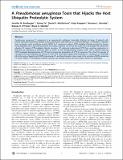| dc.contributor.author | Bomberger, Jennifer M. | |
| dc.contributor.author | Ye, Siying | |
| dc.contributor.author | MacEachran, Daniel P. | |
| dc.contributor.author | Koeppen, Katja | |
| dc.contributor.author | Barnaby, Roxanna L. | |
| dc.contributor.author | O'Toole, George A. | |
| dc.contributor.author | Stanton, Bruce A. | |
| dc.date.accessioned | 2011-09-02T20:39:37Z | |
| dc.date.available | 2011-09-02T20:39:37Z | |
| dc.date.issued | 2011-03 | |
| dc.date.submitted | 2010-08 | |
| dc.identifier.issn | 1553-7366 | |
| dc.identifier.issn | 1553-7374 | |
| dc.identifier.uri | http://hdl.handle.net/1721.1/65611 | |
| dc.description.abstract | Pseudomonas aeruginosa (P. aeruginosa) is an opportunistic pathogen chronically infecting the lungs of patients with chronic obstructive pulmonary disease (COPD), pneumonia, cystic fibrosis (CF), and bronchiectasis. Cif (PA2934), a bacterial toxin secreted in outer membrane vesicles (OMV) by P. aeruginosa, reduces CFTR-mediated chloride secretion by human airway epithelial cells, a key driving force for mucociliary clearance. The aim of this study was to investigate the mechanism whereby Cif reduces CFTR-mediated chloride secretion. Cif redirected endocytosed CFTR from recycling endosomes to lysosomes by stabilizing an inhibitory effect of G3BP1 on the deubiquitinating enzyme (DUB), USP10, thereby reducing USP10-mediated deubiquitination of CFTR and increasing the degradation of CFTR in lysosomes. This is the first example of a bacterial toxin that regulates the activity of a host DUB. These data suggest that the ability of P. aeruginosa to chronically infect the lungs of patients with COPD, pneumonia, CF, and bronchiectasis is due in part to the secretion of OMV containing Cif, which inhibits CFTR-mediated chloride secretion and thereby reduces the mucociliary clearance of pathogens. | en_US |
| dc.description.sponsorship | National Institutes of Health (U.S.) (NIH grants R01-HL074175) | en_US |
| dc.description.sponsorship | National Institutes of Health (U.S.) (R01-DK/HL-45881) | en_US |
| dc.description.sponsorship | National Institutes of Health (U.S.) (5P20RR018787-08) | en_US |
| dc.description.sponsorship | National Institutes of Health (U.S.) (R01-AI083256) | en_US |
| dc.description.sponsorship | Cystic Fibrosis Foundation (CF RDP) | en_US |
| dc.description.sponsorship | Cystic Fibrosis Foundation (BOMBER08F0) | en_US |
| dc.language.iso | en_US | |
| dc.publisher | Public Library of Science | en_US |
| dc.relation.isversionof | http://dx.doi.org/10.1371/journal.ppat.1001325 | en_US |
| dc.rights | Creative Commons Attribution | en_US |
| dc.rights.uri | http://creativecommons.org/licenses/by/2.5/ | en_US |
| dc.source | PLoS | en_US |
| dc.title | A Pseudomonas aeruginosa Toxin that Hijacks the Host Ubiquitin Proteolytic System | en_US |
| dc.type | Article | en_US |
| dc.identifier.citation | Bomberger, Jennifer M. et al. “A Pseudomonas Aeruginosa Toxin That Hijacks the Host Ubiquitin Proteolytic System.” Ed. John Rohde. PLoS Pathogens 7.3 (2011) : e1001325. | en_US |
| dc.contributor.department | Massachusetts Institute of Technology. Department of Biology | en_US |
| dc.contributor.approver | MacEachran, Daniel P | |
| dc.contributor.mitauthor | MacEachran, Daniel P. | |
| dc.relation.journal | PLoS Pathogens | en_US |
| dc.eprint.version | Final published version | en_US |
| dc.type.uri | http://purl.org/eprint/type/JournalArticle | en_US |
| eprint.status | http://purl.org/eprint/status/PeerReviewed | en_US |
| dspace.orderedauthors | Bomberger, Jennifer M.; Ye, Siying; MacEachran, Daniel P.; Koeppen, Katja; Barnaby, Roxanna L.; O'Toole, George A.; Stanton, Bruce A. | en |
| mit.license | PUBLISHER_CC | en_US |
| mit.metadata.status | Complete | |
